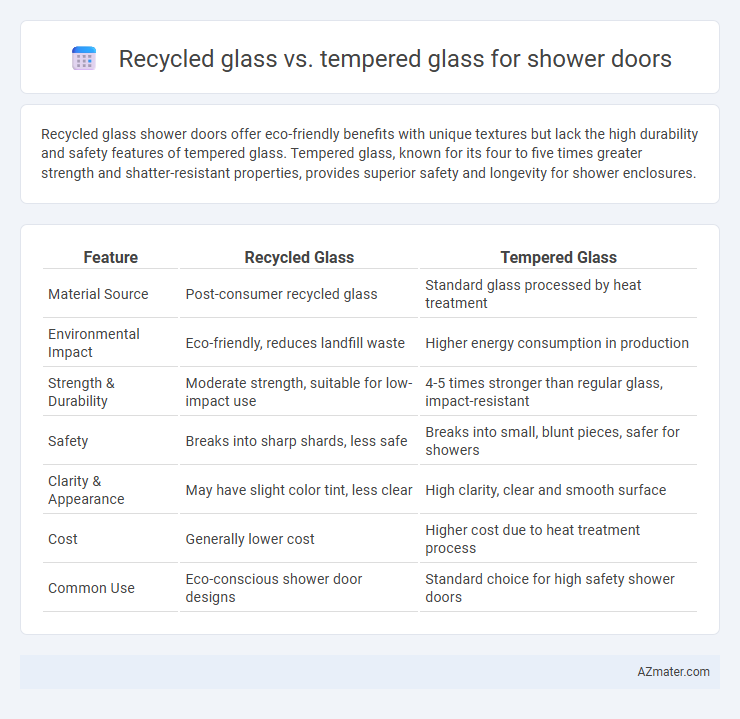Recycled glass shower doors offer eco-friendly benefits with unique textures but lack the high durability and safety features of tempered glass. Tempered glass, known for its four to five times greater strength and shatter-resistant properties, provides superior safety and longevity for shower enclosures.
Table of Comparison
| Feature | Recycled Glass | Tempered Glass |
|---|---|---|
| Material Source | Post-consumer recycled glass | Standard glass processed by heat treatment |
| Environmental Impact | Eco-friendly, reduces landfill waste | Higher energy consumption in production |
| Strength & Durability | Moderate strength, suitable for low-impact use | 4-5 times stronger than regular glass, impact-resistant |
| Safety | Breaks into sharp shards, less safe | Breaks into small, blunt pieces, safer for showers |
| Clarity & Appearance | May have slight color tint, less clear | High clarity, clear and smooth surface |
| Cost | Generally lower cost | Higher cost due to heat treatment process |
| Common Use | Eco-conscious shower door designs | Standard choice for high safety shower doors |
Introduction: Choosing the Right Shower Door Material
Recycled glass shower doors offer an eco-friendly option by repurposing waste glass into durable panels, reducing environmental impact while maintaining aesthetic appeal. Tempered glass, known for its strength and safety, undergoes heat treatment to withstand impact and thermal stress, making it ideal for shower enclosures. Selecting between recycled and tempered glass depends on priorities such as sustainability, durability, safety standards, and design preferences for the bathroom space.
What is Recycled Glass?
Recycled glass is made from post-consumer and post-industrial glass waste that is crushed and melted to create new glass products, reducing the need for raw materials and lowering environmental impact. In shower doors, recycled glass offers eco-friendly benefits while maintaining clarity and durability similar to traditional glass options. Tempered glass, although stronger and safer due to heat treatment, typically uses virgin materials and has a higher carbon footprint compared to recycled glass alternatives.
What is Tempered Glass?
Tempered glass is a type of safety glass processed through controlled thermal or chemical treatments to increase its strength compared to normal glass. It is commonly used in shower doors due to its durability, resistance to impact, and the way it breaks into small, blunt pieces rather than sharp shards. Unlike recycled glass, tempered glass offers enhanced safety features and is designed to withstand sudden temperature changes, making it ideal for bathroom environments.
Durability and Strength Comparison
Tempered glass for shower doors offers superior strength, with a tensile strength of approximately 24,000 psi compared to recycled glass, which generally lacks structural reinforcement and is more prone to cracking. Tempered glass undergoes a heat treatment process that enhances its durability and shatter resistance, making it ideal for high-impact environments like bathrooms. Recycled glass may provide eco-friendly benefits but typically does not match the resilience and safety standards of tempered glass in shower door applications.
Aesthetics: Look and Style Differences
Recycled glass shower doors showcase a distinct, eco-friendly aesthetic with unique textures and subtle color variations, offering a more artisanal and rustic appeal. Tempered glass features a sleek, smooth, and crystal-clear finish that enhances modern and minimalist bathroom designs with its polished and uniform appearance. The choice between recycled and tempered glass significantly impacts the overall style, with recycled glass adding character through its organic imperfections, while tempered glass provides a contemporary, clean look.
Safety Features of Recycled vs Tempered Glass
Tempered glass offers superior safety features for shower doors due to its heat-treated process, making it up to five times stronger than standard glass and shattering into small, blunt pieces that reduce injury risk. Recycled glass, while environmentally friendly, typically undergoes less rigorous safety treatments and may lack the structural integrity and controlled breakage patterns of tempered glass. Choosing tempered glass for shower doors ensures enhanced durability and safer impact resistance compared to recycled glass options.
Environmental Impact and Sustainability
Recycled glass shower doors significantly reduce landfill waste and lower energy consumption by repurposing existing materials, contributing to a smaller carbon footprint compared to new tempered glass production. Tempered glass requires high energy input for heat treatment and typically relies on virgin raw materials, increasing its environmental impact and resource depletion. Choosing recycled glass supports sustainable building practices and promotes circular economy principles in bathroom design.
Cost Comparison: Recycled Glass vs Tempered Glass
Recycled glass shower doors typically cost 10-20% less than tempered glass options due to lower raw material expenses and energy consumption during production. Tempered glass commands higher prices because of its enhanced strength and safety features, often costing between $50 to $100 per square foot compared to $40 to $80 for recycled glass. Choosing recycled glass can reduce overall installation costs while maintaining adequate durability for residential shower enclosures.
Maintenance and Cleaning
Recycled glass shower doors require gentle, non-abrasive cleaners to preserve their eco-friendly finish and prevent etching, making regular maintenance crucial for longevity. Tempered glass is highly resistant to scratches and thermal stress, allowing for easier cleaning with standard glass cleaners and reduced risk of damage over time. Both types benefit from routine squeegeeing to minimize water spots and soap scum buildup, but tempered glass offers a more durable and low-maintenance option.
Which Shower Door Glass is Best for You?
Recycled glass shower doors offer eco-friendly benefits and unique aesthetic appeal, while tempered glass provides superior strength, safety, and durability essential for daily bathroom use. Tempered glass is engineered to withstand impact and thermal stress, making it the best choice for high-traffic showers requiring long-lasting performance and enhanced safety. Choose recycled glass for sustainability and distinct style, but select tempered glass if safety, reliability, and industry standards are your top priorities.

Infographic: Recycled glass vs Tempered glass for Shower door
 azmater.com
azmater.com